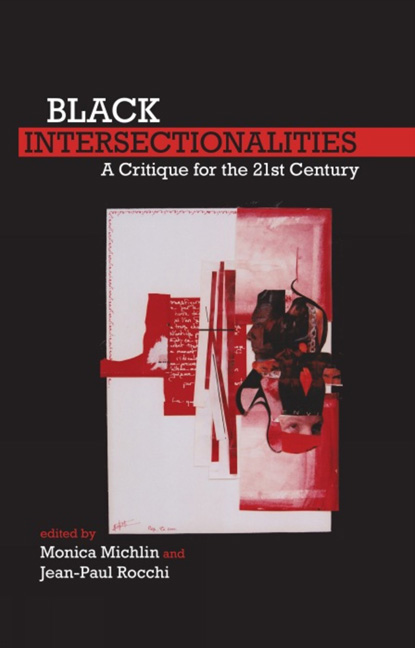Book contents
- Frontmatter
- Contents
- 1 Introduction: Theorizing for Change: Intersections, Transdisciplinarity, and Black Lived Experience
- 2 Exordium: Writing and the Relation: From Textual Coloniality to South African Black Consciousness
- I Challenging Hegemonic Gender Identities
- II Nonconformity and Narrative heorizing
- III Upsurges of Desire
- 9 “Risking Sensuality”: Toni Morrison's Erotics of Writing
- 10 Cultures of Melancholia: Theorizing Desire and the Black Body
- 11 Richard Wright's Poetics of Black Being: Metaphor, Desire, and Doing
- IV Epistemological Genealogies and Prospections
- Contributors
- Index
11 - Richard Wright's Poetics of Black Being: Metaphor, Desire, and Doing
from III - Upsurges of Desire
- Frontmatter
- Contents
- 1 Introduction: Theorizing for Change: Intersections, Transdisciplinarity, and Black Lived Experience
- 2 Exordium: Writing and the Relation: From Textual Coloniality to South African Black Consciousness
- I Challenging Hegemonic Gender Identities
- II Nonconformity and Narrative heorizing
- III Upsurges of Desire
- 9 “Risking Sensuality”: Toni Morrison's Erotics of Writing
- 10 Cultures of Melancholia: Theorizing Desire and the Black Body
- 11 Richard Wright's Poetics of Black Being: Metaphor, Desire, and Doing
- IV Epistemological Genealogies and Prospections
- Contributors
- Index
Summary
In this chapter, I examine how Richard Wright, in The Man Who Lived Underground (1944), puts into practice what Paul Ricoeur describes as metaphor's knowledge of its relation to being. The poetics I describe are evident not in this novella alone; they appear in many familiar works of African American literature throughout the modern period. While this chapter cannot, of course, lay claim to a comprehensive study that presents an exhaustive overview of all the texts that constitute this literary tradition; my hope is that my analysis will suggest a theory of metaphor alive in Wright's work, a theory that I elsewhere develop more fully as I examine other African American texts equally concerned with the poetics of black being.
Wright, who highly valued and regularly profited from textual metaphors that revealed both a critical ontology and a critical epistemology, calls our attention to metaphorical matters when he opines in “Blueprint for Negro Writing” (1937) that the “image and emotion” of literature “possess a logic of their own” (2004: 1410). He insists that affect and imagery – including figures of language such as conceptual metaphors – are capable of granting form, meaning, and access to a new and better world. Underground paradoxically points the way to life in such a world through the complexities of its philosophical metaphors. I see Wright's metaphor of psychic and bodily descent as emblematic of archetypal ontological metaphors of death and life, guilt and freedom, time and space, memory and oblivion that facilitate the African American text's existential demands.
It may first be good to contextualize the concept of “being” and its relationship to metaphor before providing a more pointed discussion of metaphorical expressions of black being in Wright's novella. Martin Heidegger, whose philosophical writings Wright began studying in earnest in the 1940s (and this in spite of Heidegger's racism), was the twentieth century's foremost Western philosopher of the concept. In Being and Time (1929), Heidegger presents “Being-in-the-world” as a quasi-spiritual concept that is central to understanding human existence (2008: 83). It not only signifies being in relation to other worldly entities (whether living or inanimate), but also indicates the quality of concern that is constitutive of human being, which Heidegger calls “Dasein”.
- Type
- Chapter
- Information
- Black IntersectionalitiesA Critique for the 21st Century, pp. 158 - 176Publisher: Liverpool University PressPrint publication year: 2013



